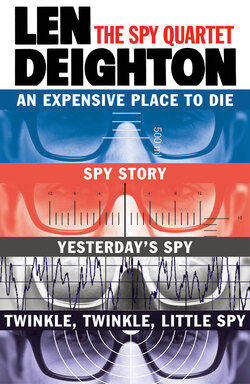Читать книгу The Spy Quartet - Len Deighton - Страница 13
На сайте Литреса книга снята с продажи.
2
ОглавлениеLe Petit Légionnaire (‘cuisine faite par le patron’) was a plastic-trimmed barn glittering with mirrors, bottles and pin-tables. The regular lunchtime customers were local businessmen, clerks from a near-by hotel, two German girls who worked for a translation agency, a couple of musicians who slept late every day, two artists and the man named Datt to whom I was to offer the nuclear fall-out findings. The food was good. It was cooked by my landlord who was known throughout the neighbourhood as la voix – a disembodied voice that bellowed up the lift shaft without the aid of a loudspeaker system. La voix – so the stories went – once had his own restaurant in Boul. Mich. which during the war was a meeting place for members of the Front National.1 He almost got a certificate signed by General Eisenhower but when his political past became clearer to the Americans he got his restaurant declared out of bounds and searched by the MPs every week for a year instead.
La voix did not like orders for steck bien cuit, charcuterie as a main dish or half-portions of anything at all. Regular customers got larger meals. Regular customers also got linen napkins but were expected to make them last all the week. But now lunch was over. From the back of the café I could hear the shrill voice of my landlady and the soft voice of Monsieur Datt who was saying, ‘You might be making a mistake, you’ll pay one hundred and ten thousand francs in Avenue Henri Martin and never see it come back.’
‘I’ll take a chance on that,’ said my landlord. ‘Have a little more cognac.’
M. Datt spoke again. It was a low careful voice that measured each word carefully, ‘Be content, my friend. Don’t search for the sudden flashy gain that will cripple your neighbour. Enjoy the smaller rewards that build imperceptibly towards success.’
I stopped eavesdropping and moved on past the bar to my usual table outside. The light haze that so often prefaces a very hot Paris day had disappeared. Now it was a scorcher. The sky was the colour of well-washed bleu de travail. Across it were tiny wisps of cirrus. The heat bit deep into the concrete of the city and outside the grocers’ fruit and vegetables were piled beautifully in their wooden racks, adding their aroma to the scent of a summer day. The waiter with the withered hand sank a secret cold lager, and old men sat outside on the terrasse warming their cold bones. Dogs cocked their legs jauntily and young girls wore loose cotton dresses and very little make-up and fastened their hair with elastic bands.
A young man propped his moto carefully against the wall of the public baths across the road. He reached an aerosol can of red paint from the pannier, shook it and wrote ‘lisez l’Humanite nouvelle’ across the wall with a gentle hiss of compressed air. He glanced over his shoulder, then added a large hammer and sickle. He went back to his moto and sat astride it surveying the sign. A thick red dribble ran down from the capital H. He went back to the wall and dabbed at the excess paint with a piece of rag. He looked around, but no one shouted to him, so he carefully added the accent to the e before wrapping the can into the rag and stowing it away. He kicked the starter, there was a puff of light-blue smoke and the sudden burp of the two-stroke motor as he roared away towards the Boulevard.
I sat down and waved to old Jean for my usual Suze. The pin-table glittered with pop-art-style illuminations and click-clicked and buzzed as the perfect metal spheres touched the contacts and made the numbers spin. The mirrored interior lied about the dimensions of the café and portrayed the sunlit street deep in its dark interior. I opened the case of documents, smoked, read, drank and watched the life of the quartier. I read ninety-three pages and almost understood by the time the rush-hour traffic began to thicken. I hid the documents in my room. It was time to visit Byrd.
I lived in the seventeenth arrondissement. The modernization project that had swept up the Avenue Neuilly and was extending the smart side of Paris to the west had bypassed the dingy Quartier des Ternes. I walked as far as the Avenue de la Grande Armée. The Arc was astraddle the Étoile and the traffic was desperate to get there. Thousands of red lights twinkled like bloodshot stars in the warm mist of the exhaust fumes. It was a fine Paris evening, Gauloises and garlic sat lightly on the air, and the cars and people were moving with the subdued hysteria that the French call élan.
I remembered my conversation with the man from the British Embassy. He seemed upset today, I thought complacently. I didn’t mind upsetting him. Didn’t mind upsetting all of them, come to that. No cause to believe it’s anything other than genuine. I snorted loudly enough to attract attention. What a fool London must think I am. And that stuff about Byrd. How did they know I’d be dining with him tonight? Byrd, I thought, art books from Skira, what a lot of cock. I hardly knew Byrd, even though he was English and did lunch in Le Petit Légionnaire. Last Monday I dined with him but I’d told no one that I was dining with him again tonight. I’m a professional. I wouldn’t tell my mother where I keep the fuse wire.
